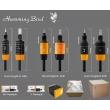Health risks
Main article: Tattoo medical issues
Modern tattoo artist's nitrile gloves and sterilized equipment
Because it requires breaking the skin barrier, tattooing may carry health risks, including infection and allergic reactions. Modern tattooists reduce such risks by following universal precautions, working with single-use items, and sterilizing their equipment after each use. Many jurisdictions require that tattooists have blood-borne pathogen training, such as is provided through the Red Cross and OSHA.
In amateur tattoo machines, such as those applied in prisons, however, there is an elevated risk of infection. Infections that can theoretically be transmitted by the use of unsterilized tattoo equipment or contaminated ink include surface infections of the skin, herpes simplex virus, tetanus, staph, fungal infections, some forms of hepatitis, tuberculosis, and HIV.[35] In the United States there have been no reported cases of HIV contracted via commercially-applied tattooing process.[36]
Tattoos increase the risk of hepatic disease, which will be exacerbated by the steatohepatitis that alcohol induces. Therefore it has been highly recommended not to drink for at least two months after getting a tattoo, though the risk will still not have completely diminished.[citation needed] Hepatic disease is a serious condition frequently involving jaundicing—to be exact, the yellowing appearance of the skin, furthermore, spontaneous bleeding primarily from the joints. Risk of infections is also increased, and coupled with hepatic disease, can result in exsanguination.
Tattoo inks have been described as "remarkably nonreactive histologically".[27] However, cases of allergic reactions to tattoo inks, particularly certain colors, have been medically documented. Occasionally, when a blood vessel is punctured during the tattooing procedure a bruise/hematoma may appear. This is sometimes due to nickel in an ink pigment, which is a common metal allergy.








